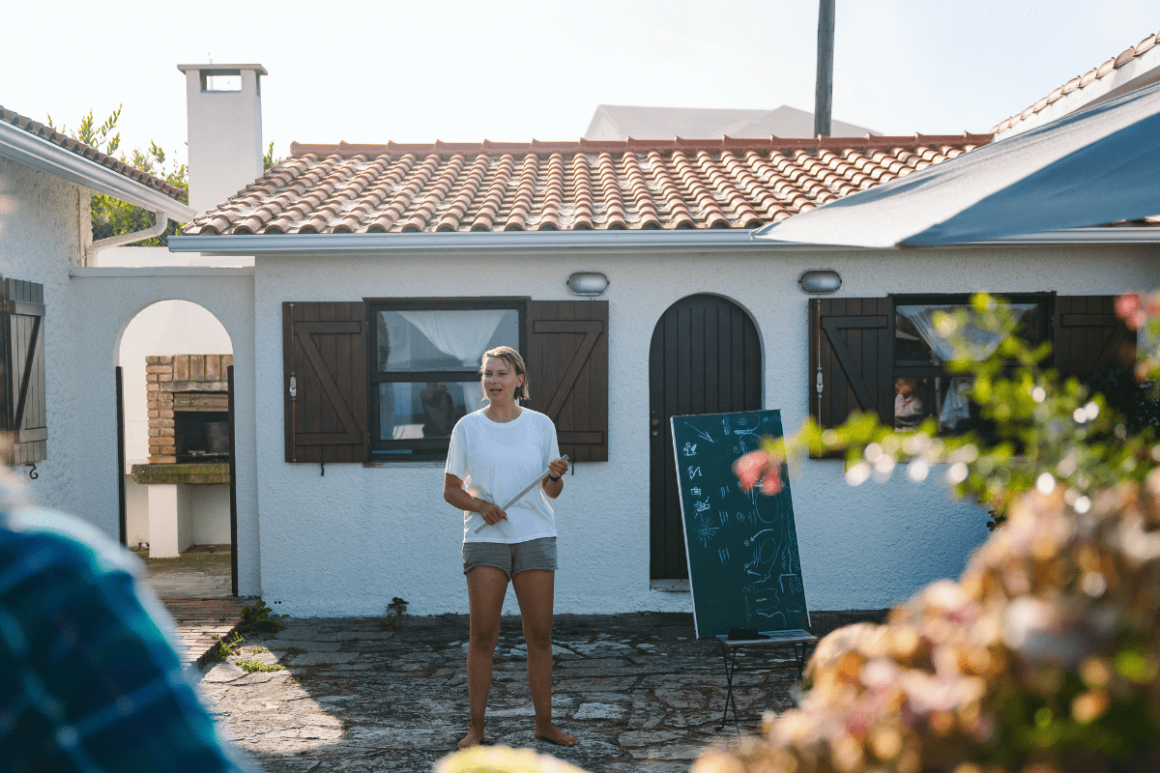Learning to surf without fear – mental strength on the water
Surfing is more than just a sport. It is a way of life, a challenge for body and mind, a dance with the natural force of the sea. But the path to the perfect wave is often paved with fears and insecurities. How do you assert yourself in the lineup? How do you overcome the fear of high waves or strong currents? In this article, we take a deeper dive into the mental aspects of surfing. We show how our approach at Goodtimes Surfcamp with professional instruction, small groups and a safe environment can be the perfect solution to overcoming these hurdles and discovering the pure joy of surfing.
The psychology of surfing: a rollercoaster of emotions
Surfing is a sport that pushes us to our limits. It is a constant alternation between adrenaline, euphoria and sometimes fear. Beginners in particular face a variety of mental challenges:

- Fear of the unknown: At first, the sea seems like an unpredictable element. The fear of big waves, currents, sea creatures or simply of falling is completely natural.
- Self-doubt: Can I really do it? Do I have the necessary strength, ability and courage to stand on the surfboard?
- Pressure to perform: The desire to progress quickly and catch the perfect wave or to surf as much as possible on vacation can lead to frustration and disappointment if the reality does not meet expectations.
- Lineup stress: asserting yourself in the lineup, observing the right of way rules and catching the right wave at the right moment can be intimidating for beginners and lead to uncertainty.
The Goodtimes surf camp: your safe haven on the way to the perfect wave
Our surf camp offers the ideal environment to master these mental challenges when learning to surf and to enjoy your surfing vacation in a relaxed manner:
- Professional instruction: Our experienced surf instructors at Goodtimes Surfcamp know the typical fears and insecurities of beginners. They not only teach the right technique, paddling, standing up, wave selection and maneuvers, but also the necessary self-confidence and mental strength to feel safe in the water and discover your own abilities.
- Small groups: In the small groups in our surf courses, our surf instructors can respond individually to each student and specifically reduce fears. They give personal feedback, recognize strengths and weaknesses and adapt the lessons to the needs of each individual. The exchange with other course participants at your level also creates a supportive and motivating atmosphere in which you can encourage each other and celebrate successes.
- Step-by-step progression: In our surf courses, the learning content is built up step by step, from standing safely on the board on the beach to practicing in white water to the first experience in the lineup and the first green waves. This allows beginners to progress at their own pace and build up their confidence before taking on bigger challenges. Our surf instructors select the right waves and spots to ensure a safe and successful learning experience.
- Safety awareness: Safety is our top priority at the surf camp. Our surf instructors explain the challenges of the sea, such as currents, tides, rocks and other surfers. They teach the correct behavior in the water to avoid accidents and protect themselves and others. They are trained in first aid and rescue techniques and ensure that every student feels comfortable and safe in the water.
- Theory and mental aspects: Our experienced surf instructors are also on hand during the theory sessions to answer questions, give individual advice and create an open atmosphere for discussing personal challenges. This ensures that the mental preparation is optimally tailored to the needs of each individual and contributes to a holistic learning experience.

Mental strength on the water: 5 tips for more self-confidence when learning to surf
In addition to professional instruction from our surf instructors, there are also a few things you can do yourself to improve your mental strength on the water:
- Set realistic goals: Don’t overtax yourself right at the start. Set small, achievable goals, such as “today I’ll manage to stand up three times” or “I’ll paddle out to the green wave”. Celebrate every success, be proud of yourself and motivate yourself for the next challenge.
- Visualize your success: Imagine riding the perfect wave, how you feel on the board, the water rushing past you and the sun shining on your face. Visualization can help reduce anxiety when learning to surf, boost your confidence and prepare you mentally for the wave.
- Breathe deeply: When you feel anxiety or stress, focus on your breathing. Deep breaths can help to calm you down, strengthen your nerves and supply your body with oxygen. Breathe in, breathe out, find your rhythm and let go of tension.
- Trust in your abilities: Remember what you have already learned and trust that you can master the challenge. You have already made progress, you have the strength and ability to stand on the board. Believe in yourself and your abilities.
- Enjoy the moment: above all, surfing should be fun! Forget the pressure to perform and just enjoy the feeling of being on the water, feeling the waves, experiencing nature and feeling free. Be grateful for the opportunity to learn to surf. Be inspired by the positive energy of the camp and the group.

The Goodtimes surf camp: learn to surf in a family atmosphere
The Goodtimes Surfcamp is more than just a place to learn to surf. It’s a community of like-minded people who share a passion for more than just surfing. Here you will make new friends, experience unforgettable moments and create memories for life. The relaxed atmosphere, professional instruction and small groups make the Goodtimes surf camp the ideal place to overcome your fears, boost your self-confidence and discover the pure joy of surfing.






